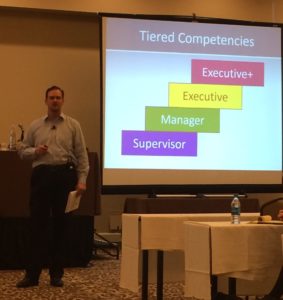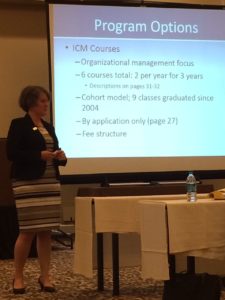What is Judicial Branch Education?
Under the Constitution of the United States, citizens have the right to due process - if accused of a crime, we each have the right to a fair trial, conducted in a court of law by a judge. But how do judges learn everything they need to know about the law, which is constantly changing? How do they know how best to lead their staff in a way that will provide those in court access to due process? They read the law, they talk to each other and share ideas, or they turn to a judicial branch educator.
Last week in Seattle, judges and judicial educators from across the country gathered at the National Association of Judicial Educators (NASJE) and the American Judges Association (AJA) joint conference. Founded in 1975, NASJE sets the bar for judicial branch education and facilitates the sharing of resources among educators in the field. The AJA was founded in 1959 by municipal court judges and now has more than 3,000 members, some international. The AJA’s primary goal is to ensure the effective administration of justice, and the organization achieves its goal by providing judicial education opportunities and bringing current and former judges together to share knowledge.
For the first time, these two organizations met at the same time, which allowed for even more discussion and consideration of the topics on the agenda. Topics that were hit upon during the conference included case management, succession planning, equality and fairness, and how to create engaging curriculum for judges about emerging issues they see in their courts. Judicial leadership - the need for judges to use their platform to bring individuals together in the hope of causing change - was also discussed in depth.
One of the topics that got the most attention was drugs. Just as law enforcement officers, medical professionals and treatment providers nationwide are seeing an increase in illegal drug use and abuse, judges are, too - in their courtrooms. The individual who is arrested at roadside for driving under the influence of drugs will have his day in court, and it will fall to the judge to know what the best course of action for each individual is. Judicial educators are working furiously to help judges learn about the laws in their states, even as the laws change, while judges grapple with what to do to help the people they see, protect the community and upholding the law. As new legislation is enacted at the state level, what judges can do sometimes has to change.
Responsibility.org has partnered with NASJE for many years to provide judges and judicial educators resources and training materials to effectively adjudicate DUI cases. In 2014, we produced the second edition of our Hardcore Drunk Driving Judicial Guide with input from our Judicial Education Advisory Panel, which includes several NASJE members. Earlier this year, we launched "Effective Judicial Interventions for Underage Drinking Offenders," a free online course that was developed by the National Center for State Courts. We have also partnered with Suffolk Law School to develop an online course for law school students that will provide them with the tools to prosecute DUI cases, which are often some of the most complicated cases heard in court. The inherently scientific nature of these cases in conjunction with an experienced and organized defense bar can also be intimidating for new lawyers. The course will be available in 2016.
We are honored to be a sponsor of NASJE and help judges and judicial educators as emerging issues come to light and laws change. To learn more about NASJE, visit www.nasje.org.
- Jeff Schrade, Education Services Division Director for the Arizona Supreme Court Administrative Office of the Courts
- Margaret Allen, Education Program Manager for the Judicial College of the Supreme Court of Ohio
Devin Burke, Manager, Government Relations and Traffic Safety, joined Responsibility.org in 2011 and immediately became interested in the organization’s many programs and issue areas, especially those related to judicial education.


